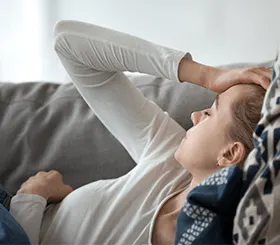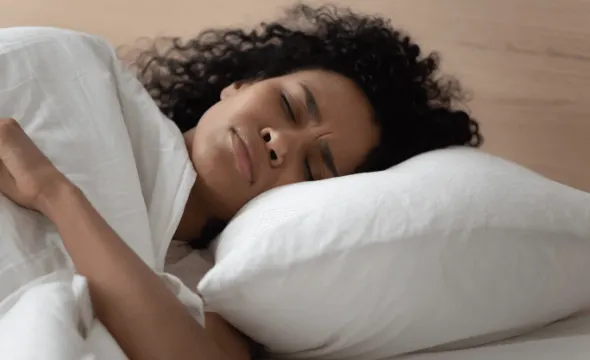What Is PMS? Meaning, Causes & Symptoms

Ladies, we’ve got you covered!
Have you ever noticed that at the onset of your periods, you start feeling a little different, physically, and emotionally? When you express how you feel, people around you have a standard response, “You are PMSing”. But have you ever wondered what’s the meaning of PMSing and what does PMS stand for? Ladies, we’ve got you covered! If you're a girl who is just stepping into her puberty or a woman who is already menstruating, we've all the details related to what is PMS and how PMS symptoms before period can be treated.
What is PMS?
PMS meaning includes a wide range of symptoms and changes that your body may go through at the onset of your monthly period. It’s popularly known as PMS but, it’s an abbreviation for premenstrual syndrome. Typically, most women experience some form of PMS a week or so before the onset of their period.
The symptoms of premenstrual syndrome can vary from girl to girl and can also mean different things. From PMS cramps and bloating to emotional changes, PMS can affect your body in different ways. Read more about period bloating causes & remedies.
When does PMS start?
Chances are you might start PMSing or experiencing pre-period symptoms five to 11 days before your day one of periods. If you are worried about how long PMS lasts then you can relax. Typically, your premenstrual symptoms would go away once your periods begin and thereby you would stop PMSing.
What are PMS symptoms?
If you're PMSing, you will know it right away. However, if you're new to the world of PMS, here are some common premenstrual symptoms to watch out for:
- Cramps
- Backaches
- Mood swings and mild depression
- Breast tenderness
- Skin problems
- Headaches
- Acne
- Irritability
- Bloating before periods
- Angry outbursts
The intensity of the above pre-period symptoms can vary for every girl and woman. Studies suggest that about 75% of women get some form of PMS and experience PMS cramps, PMS headaches, or mood swings in varying intensities. This tells us that PMS is common and if you experience it, you are not alone.
Going through these symptoms can be extremely daunting and uncomfortable. But it is important to know that PMS is completely normal and happens to most women in some form or the other. However, if you experience severe discomfort or pain, you must consult your doctor and seek medical help immediately. Some women experience a severe form of PMS, PMDD or Premenstrual Dysphoric Disorder. Read more about PMS symptoms before period.

From PMS cramps and bloating to emotional changes, PMS can affect your body in different ways.
What is PMDD?
PMDD stands for Premenstrual dysphoric disorder. Consider it as a version of premenstrual syndrome which is a little serious. For instance, you might experience mood swings, tender breasts, or fatigue while PMSing. But when it comes to PMDD symptoms, they can be quite draining. You might experience intense anger, a feeling of hopelessness, trouble concentrating or even a change in your appetite. The level of intensity of these PMDD symptoms could be such that it can hinder your day-to-day life.
Causes of PMS
Even though it’s common for women to experience PMS mood swings, headaches or even PMS cramps, the cause behind it is still unclear. However, here are some factors that play a part in leading PMS or making it worse:
- Hormonal Changes
- Chemical fluctuation in brain
- Intake of too much salt
- Inactive lifestyle
- Depression
- Stress
- Smoking

How to cope with PMS?
Dealing with PMS symptoms before period and its forms can be challenging and frustrating. However, there are ways to beat the PMS blues and feel better. Here are some PMS treatment methods that you can try in your everyday life:
1.Sharing is caring
Talk to your friends, family, and loved ones about how you're feeling. Sharing your thoughts and feelings can help take the edge off some of the unpleasant emotions.2.Get a good night's sleep
Make sure you get a full night's sleep. Being well-rested can work wonders for boosting your energy levels and your mood.3. Eat well
Maintain a healthy diet and eat plenty of fruits and veggies. Foods like bananas, oats, berries, nuts, and seeds are known to be mood boosters. A bar of dark chocolate can also work wonders in elevating your spirits.4. Find ways to relax
One of the best ways of coping with PMS is to find new ways to relax. Whether it's curling up with your favourite book, listening to music, or taking a long walk in the park, it can help you relax and make you feel good.5. Pamper yourself
PMS can be hard, but it can also be an opportunity for you to pamper yourself. After all, you deserve to be loved and cared for during your tough days.6. PMS Supplements
You can also opt for PMS supplements that can help you get through premenstrual pain. But make sure to consult your doctor before taking any kind of supplements.Now that you know what PMS is and how to cope with PMSing, it’s time to prepare for the real deal which is your periods. Try out the [ALWAYS Platinum Ultra Thin Pads](/sanitary-pads/always-platinum-and-diamond-ultra-thin-sanitary-pads-with-wings) which have soft non-woven top sheet and odour neutralising technology that keeps you protected and fresh! It’s designed with cottony-soft micro-cushions which deliver comfort and protection. In addition, it also has a gel-based extra absorbent core that locks the menstrual discharge quickly.
In case you are an avid tampon user, the ALWAYS TAMPAX Cardboard Tampons are your best pick! These have quick-absorption channels and a cardboard applicator which ensures leak-free protection for up to eight hours. It also has a protective skirt that acts as an additional protector and keeps you dry. The best part is that these tampons are made available in different variants for optimal absorbency.
Additionally, you can explore a wide range of Always feminine hygiene products like sanitary pads, tampons and Panty liners to take care of all your menstrual hygiene needs during your tough days.
The Bottom Line
Dealing with PMS can be a little tough. At times like these, all you need to do is sit back and relax. Remember that once you start menstruating you will be back to feeling your true self!
Now with Always Period calculator, calculate your next period and track your ovulation day.
FAQs
What does PMS stand for?
PMS stands for premenstrual syndrome, a set of physical and emotional changes experienced by women in the days leading up to their periods.
How long does PMS last?
The PMS symptoms tend to last up until the time your menstruation begins.
Why am I so moody before my period?
As your period approaches, the serotonin levels in your brain which are responsible for your mood tend to change. This causes you to be moody before your period.










